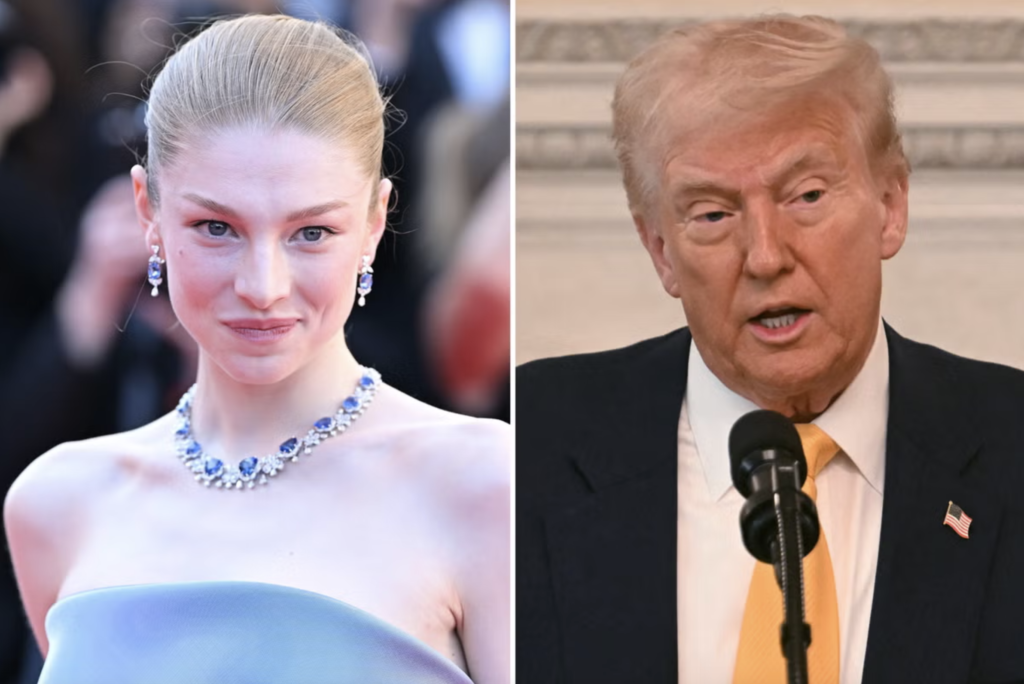Actress Hunter Schafer recently took to TikTok to share her experience following an executive order issued by former President Donald Trump. The order mandates that government agencies recognize individuals solely by their gender assigned at birth, a policy that has had unexpected and personal consequences for Schafer. Her revelation has sparked widespread discussion about the real-life impacts of such policies on transgender individuals.
A Shocking Discovery
Schafer, who publicly came out as transgender in ninth grade, revealed that after losing her passport in Spain, she applied for a replacement—only to find that her gender marker had been changed from female to male. The discovery was both unexpected and unsettling, as she had previously been recognized as female in her identification documents.
In her video, Schafer admitted she was initially skeptical about the implications of Trump’s executive order. However, the reality hit home when she received her new passport and realized the policy had directly affected her.
“This is not just political rhetoric; this is real, and it’s happening now,” Schafer told her followers, highlighting how bureaucratic decisions can have deeply personal consequences.

Challenges of Identification and Travel
One of Schafer’s biggest concerns is how this change will impact her daily life, especially during international travel. Having an identification document that does not align with her gender presentation could lead to uncomfortable and potentially invasive situations at border controls.
“For trans people, the ability to move freely and without constant scrutiny is already difficult,” Schafer noted. “This makes it even harder.”
Transgender individuals often face heightened scrutiny when traveling, as discrepancies between gender presentation and official documentation can lead to questioning, delays, and even denial of entry. Schafer now finds herself in a position where she may have to disclose her transgender identity more frequently than she would prefer, which could subject her to discrimination or unnecessary invasive procedures.

The Broader Impact of Trump’s Executive Order
Trump’s executive order represents a significant rollback of transgender rights, particularly in the realm of legal recognition. Under previous policies, transgender individuals could amend their gender markers on official documents based on their gender identity. The new policy, however, effectively reverses that progress by requiring federal agencies to use an individual’s assigned sex at birth.
LGBTQ+ advocates have raised concerns about the broader implications of this change, warning that it could lead to further discrimination in healthcare, employment, and legal protections. Critics argue that such policies undermine the dignity and rights of transgender individuals, forcing them to navigate a society that does not legally acknowledge their identities.

A Message of Resilience and Support
Despite the challenges, Schafer concluded her message with an uplifting note, affirming that her identity is not defined by a government-issued document.
“A passport doesn’t change who I am,” she declared. “I know who I am, and so does my community.”
Schafer also took the opportunity to extend her support to other transgender individuals who may be facing similar obstacles. She emphasized the importance of solidarity and resilience, encouraging her followers to continue advocating for their rights despite political setbacks.

The Ongoing Debate: Policy vs. Identity
Schafer’s experience highlights the complex relationship between government policies and personal identity. Her situation underscores the broader debate over whether official documents should dictate an individual’s identity or whether self-identification should be the guiding principle.
This issue is particularly pressing given the potential legal battles that could arise from the executive order. Civil rights organizations have already signaled their intent to challenge the policy in court, arguing that it violates fundamental rights and creates unnecessary hardships for transgender individuals.

Community and Advocacy
Schafer’s public platform allows her to bring attention to the difficulties faced by transgender individuals in navigating bureaucratic systems. Her advocacy is part of a growing movement calling for more inclusive policies that respect and affirm the identities of all individuals.
Trans rights organizations have lauded Schafer for using her voice to shed light on these issues, emphasizing that visibility is crucial in the fight for equality. By sharing her story, Schafer has helped to humanize the policy debate, putting a real face to the consequences of governmental decisions.
What Comes Next?
As Schafer continues to navigate this unexpected challenge, her story is likely to fuel further discussions on transgender rights, legal recognition, and the role of government in defining identity.
Legal experts anticipate that challenges to Trump’s executive order could result in significant legal battles that may reach the Supreme Court. Meanwhile, activists and allies continue to push for policies that affirm and protect transgender individuals in all aspects of life.
For now, Schafer remains resolute in her identity and her advocacy, reminding the world that a document does not define a person.
“This is just another reminder that we still have a lot of work to do,” she said. “But we’re not going anywhere.”

